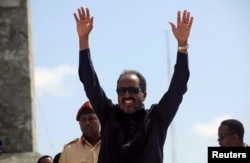Somalia's elections, which were slated to begin last weekend, have been postponed again. The government now says the polls won't start until late October.
The country's parliamentary elections have been pushed to October 23. The presidential vote has been rescheduled for November 30.
The internationally-backed process has been beset by problems.
There is political wrangling over voter delegates. National and state authorities complain the international community hasn't given pledged funding.
Meanwhile, crucial institutions such as a dispute resolution commission remain unformed.
Adam Ibrahim Aw Hirsi, the justice minister of Jubaland state, said the delays are no surprise.
"The capacity of the people that promised that they would get things done should have been doubted from day one," HirsiHirsi said. "Everybody knew this wasn't happening on time because the push from the internationals, especially to those who deal with Somalia from diplomatic offices, wanted something great to report to their respective countries that wasn't in sync with the reality on the ground."
'A first step'
But the elections will still represent a major gain for Somalia when they do happen, says presidential spokesperson Daud Aweis.
"Although this is not going to be a direct election, it is going to be a first step... This is a country which has not held elections for 47 years. Many people, if you talk about elections they don't even know how to cast their votes," said Aweis.
Technically, Somalia held a presidential poll in 2012, when parliament elected President Hassan Mohamud. But it's true there hasn't been a poll of the people since the 1960s.
This year's polls won't be a one-person one-vote process. Due to security concerns, 14,000 delegates will vote for parliament. The new parliament will then choose the president.
Joe Contreras, spokesperson for the United Nations assistance mission in Somalia, says this model isn't ideal.
But he says it is better than the 2012 poll when only 135 clan elders voted.
"I don't think that anyone is calling this a democratic election in the sense that most of us think of a democratic election," Contreras said.
Yet already this small electoral process has been hampered by accusations of misconduct.
Opposition candidate Abdirahman Abdishakur Warsame says the government is undermining other candidates, including tearing down his campaign posters.
"Government is still trying to use the state resources and state security apparatus and state money and state institutions for advancing one particular candidate, which is the incumbent president," said Warsame.
The government denies that accusation.





